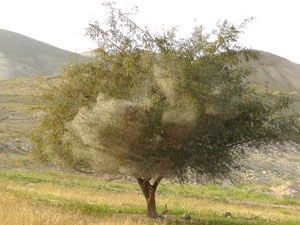- Dispersal in a colonial spider undergoing rapid range expansion: behavioral mechanisms and population consequences
Colonizing species have high dispersal ability and can establish successfully in new locations. These traits occur in many group-living species, suggesting a positive interaction between group dynamics and dispersal ability. Theory suggests that kin competition and group benefits will have opposite effects on individual decisions to stay or disperse. Dispersal decisions will be influenced also by demographic factors and condition of individuals in the group. We are investigating this interaction between dispersal and behavioral and demographic traits associated with group living in Cyrtophora citricola (Araneidae), a colonial spider undergoing rapid range expansion in Israel. The research involves (1) assessing ecological and demographic characteristics of colonies within the original species’ range and in newly inhabited areas, (2) testing proximate mechanisms of dispersal in semi-natural and laboratory conditions, and (3) employing genetic analyses to assess population genetic structure, infer movement among colonies and compare genetic diversity across the species’ range.

Cyrtophora colony in Zizyphus tree
- Sexual selection in spiders and the evolution of sexual cannibalism
Sexual cannibalism is the focus of numerous theoretical and empirical studies. Spiders, being predatory and generally cannibalistic, provide several examples of sexual cannibalism. Least understood is male-induced sexual cannibalism that occurs during or just following mating, a behavior that would seem highly disadvantageous for the male. Theory suggests that the behavior could evolve when males obtain indirect fitness benefits from self-sacrifice, or when the chances of finding an additional mate are very low. The questions we address here are 1) what fitness benefits might a male obtain from such behavior? And 2) under what conditions does it occur and is this a plastic, conditional behavior? Further to these questions, we are investigating the phenomenon of extreme sexual cannibalism in a group-living spider, in a situation where female availability should not be a limiting factor.
- Spiders as natural enemies in desert agro-ecosystems
Spiders are generalist predators with a wide range of foraging strategies. They have been shown to play a role in pest suppression in some agricultural crops, particularly in mesic regions. Their effectiveness depends, among other things, on the ability to colonize crop fields from neighboring habitats. We are investigating movement of spiders between adjacent crop and non-crop habitats in the northern Negev, using winter wheat as our focal crop. The studies include lab measurements of dispersal tendencies, field sampling of spiders to determine movement dynamics, and gut contents analysis to determine the type of prey consumed by spiders. We hope that these studies will contribute to the better management of agroecosystems to take advantage of potential natural enemies.